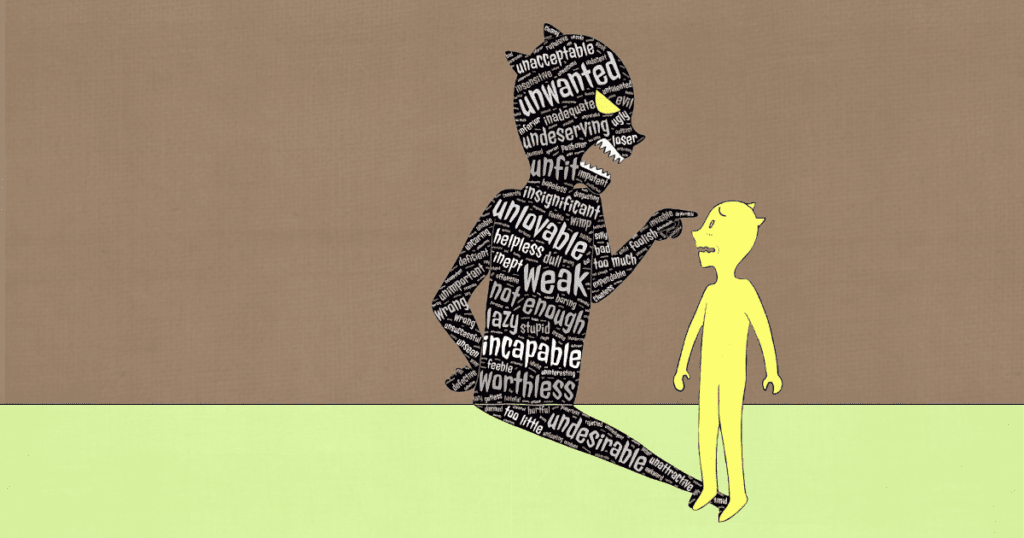3 ways to Tame your Inner Critic to find Peace and Contentment
Type “inner critic books” into Amazon and you’ll get over 700 results. Titles claim to help you banish, quiet, or tame your inner critic, or how to get freedom from it. Type “inner critic” into Google and over 50,300,000 responses await you. Clearly, it’s a widely covered topic – with good reason.
What is “Inner Critic”
The inner critic is that harsh voice in your head saying you’ll never be enough. It berates you and calls you unworthy. It does so by saying things like, “You’re not qualified,” even though you may have years of experience. Or, “You don’t have anything original to say, so you shouldn’t say anything at all.”
The purpose of the inner critic is to keep us safe, and it’s built into our DNA. The inner critic serves the role of protector so that we do whatever it takes to avoid rejection by society. We need people in order to survive, so we feel like it isn’t safe to take risks that could cause people to cast us off the island. Whether that’s being too afraid to ask a question or give your input at a group meeting or releasing a blog into the scary webosphere, the inner critic wants to make sure that you don’t look stupid, silly, or deranged, because people will not tolerate that and you’ll be shunned or thrown out of the group.
Why Should I Care About the Inner Critic?
The inner critic can make you feel bad about yourself
I’m a terrible mother/friend/daughter/spouse.
I should stop trying to be creative. I’m just not talented enough.
I’ll never amount to anything.
Have you ever had thoughts like those? These kinds of anxiety-provoking thoughts can cause you to get stuck in a loop about your worthiness. And they’re completely unfounded opinions and very likely untrue. But self criticism like this can certainly make you feel less than.
The inner critic can keep you from playing big
While the inner critic may seem like our protector, it can also be harmful if not handled properly.
In Tara Mohr’s remarkable book “Playing Big,” she discusses how the inner critic can keep you from playing big – from putting your ideas or your work out there for other people who might belittle or judge you.
Have you ever wanted to do something creative and release it into the world but were too afraid of being rejected or laughed at? Or maybe you want to help people make some kind of change in their life but something inside told you not to bother because you think you’re either too inexperienced or you wouldn’t be helpful enough.
Maybe you're less willing to share your ideas or speak up in groups. You're scared to create anything, or certainly to make it public. You may be afraid to start a business or put yourself out there in ways you’ve longed to do. This is especially true for women because that critical inner voice seems to appear louder. We’ve been made to feel like we’re supposed to follow some kind of social construct that keeps us quiet and not share our ideas.
Inner critic examples
For example, as I write this blog, my inner critic is telling me
It will never be good enough for anyone to read, that it won’t come out of my head the way I intended it to. Or, that it’s not really going to be helpful.
I’m never going to be able to give you enough information. Or the perfect information.
Or you’ll laugh at my advice or tell me you’ve heard it all before. (That was actually one of the reviews I got when I released my book.)
But if, as Tara Mohr suggests, I tap into my inner mentor instead, that “part of you that is whole, centered, loving,” she might tell me that the purpose isn’t perfection. The purpose is to begin planting the seed for readers to start recognizing their own inner critics. And that, in and of itself, is enough.
What good will it do anyone if it’s not out there? It will either find an audience that it could be useful to, or it won’t. If it doesn’t, no harm done. If it is helpful, imagine the possibility and joy of a new person finding the courage to express themselves!
The inner critic could unknowingly make you more judgmental of others
If you’re thinking these derogatory things about yourself, you could also inadvertently end up projecting your inner critic thoughts onto others. And instead of encouraging them to speak up and put themselves out there, you could be feeding their critical inner voice and accidentally sabotage their efforts to show up as their true selves. And we all have enough battles to fight. Wouldn’t you rather feel responsible for helping someone else overcome their negative thoughts?

How to Talk to the Inner Critic
1. Flex those self-awareness muscles
As you seek to find the inner critic, listen with curiosity. What is she/he/it saying to you?
As soon as we recognize it’s the inner critic that’s performing its role of trying to keep us safe by saying something disparaging, we begin to diminish its power. Ask the critic what it’s trying to protect you from, and then tell it you appreciate that it’s trying to keep you safe but that you’re ok. Dealing with the inner critic takes a lot of practice, but once you start acknowledging when the inner critic is speaking, it gets easier to quiet it so you can get back to creating or just being you – without judgment.
2. Step away from the Conversation to tame your inner critic
In “Playing Big,” Tara Mohr says, “It turns out you don’t have to find a magic source of confidence, dig deep into childhood wounds to find the roots of your insecurities, or figure out how to permanently banish that critical voice in your head. Instead, you simply need to learn how to live with the inner voice of self-doubt but not be held back by it, to hear the voice and not take direction from it.” She continues by saying, “You don’t have to win the argument with your inner critic; you have to step away from the conversation.”
3. Look for ways to help others
Not only does that get you out of your head because you’re too busy thinking about someone else, but it’s also a fantastic way to build confidence. Because the more you do for others, the more experiences you gain and the more comfortable you become putting yourself out there. Your helpful action doesn’t have to be big. In fact, the smaller the better because you’ll get more comfortable more quickly.
Making Peace with Your Inner Critic
Now that you know that the negative voice in your head is your inner critic, you can begin to work with it. The inner critic will be with you. Always. Practice learning how to engage with it in a more productive way.
Here are a few articles for more ideas about how to tame your inner critic:
And check out “Playing Big,” by Tara Mohr if you’re interested in learning how you might like to play bigger. It was a game-changer for me.
Perfection rejectionist Lisa Kiersky Schreiber is a nutrition and lifestyle coach who helps clients take a holistic and realistic approach to wellness. Lisa got off the diet carousel and can help you do the same.
Find other articles written by Lisa on her coach profile. Her philosophy will help you simplify your nutrition lifestyle so you can learn to trust yourself implicitly around food.







